Author: scarfacepride

Why an African Safari Should Top Your Travel List
- byscarfacepride
- - May 15, 2024
Home » Archives for scarfacepride » Page 2
Picture yourself watching a majestic lion as it gracefully moves through the tall grass, or seeing a herd of elephants as they go about their everyday routine. Now that’s what African Safari is all about.
You’ll see the Big Five (lion, leopard, elephant, buffalo, rhino), the great apes, the fierce predators, the unique birds, the migratory hooves, and more. All of them as close as possible, beyond your imagination. And you know what the best part is? You get to see species that are exclusive to the African savannah, including some that are about to be extinct.
From the large herds of wildebeest migrating across the Serengeti plains to predator vs prey fights, every sighting is a testament to Africa’s wildlife’s raw beauty and resilience. Whether you’re an avid nature enthusiast or a first-time safari-goer, these encounters will leave you in awe of the natural world.
Tired of the cliche destinations inundating your social media feeds? Or perhaps you’re craving for the thrill of venturing off the beaten path for your next vacation? If you’re nodding in agreement, it might be high time to contemplate adding an African safari to your travel wish list. Believe us, it’s an unparalleled experience that’s truly worthwhile.
Here are the five compelling reasons why you should add an African Safari to your bucket list and make this journey of a lifetime:
1. Witness Captivating Wildlife
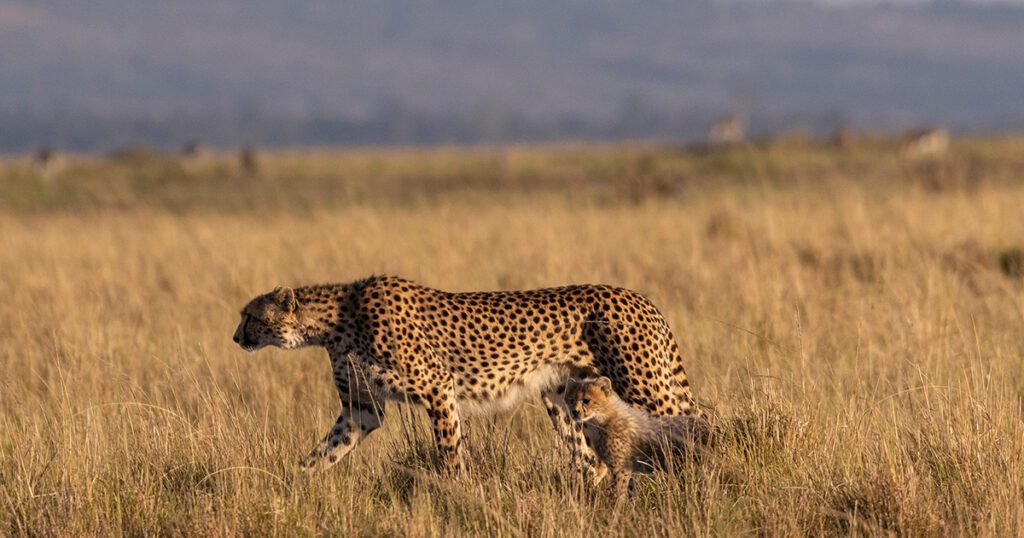
Picture yourself watching a majestic lion as it gracefully moves through the tall grass, or seeing a herd of elephants as they go about their everyday routine. Now that’s what African Safari is all about.
You’ll see the Big Five (lion, leopard, elephant, buffalo, rhino), the great apes, the fierce predators, the unique birds, the migratory hooves, and more. All of them as close as possible, beyond your imagination. And you know what the best part is? You get to see species that are exclusive to the African savannah, including some that are about to be extinct.
From the large herds of wildebeest migrating across the Serengeti plains to predator vs prey fights, every sighting is a testament to Africa’s wildlife’s raw beauty and resilience. Whether you’re an avid nature enthusiast or a first-time safari-goer, these encounters will leave you in awe of the natural world.
2. Embrace Cultural Diversity

Africa is a treasure trove of culture and heritage, where every village and community you encounter is a vibrant tapestry of traditions waiting to be explored! On safaris, you’ll get the remarkable opportunity to embark on a journey that transcends mere sightseeing and delve into the heart of this African culture!
In Kenya, you can visit the Maasai village and engage in age-old customs of one of the most iconic tribes of Africa! From participating in their energetic tribal dances to learning their intricate beadwork, you can get a glimpse of their rich heritage!
Music lovers can visit Uganda and immerse into the rhythms of their Buganda culture. Attend a traditional drumming ceremony where skilled percussionists showcase their artistry and interact with local artisans who will tell you all about the techniques passed down through generations.
The three tribal communities in Rwanda will let you partake in banana beer brewing, traditional basket weaving, maize-grinding, pottery, and more!
These diverse cultural experiences offer more than just a glimpse into the past – they provide a deeper appreciation for the complexities of African identity. By engaging with indigenous communities and traditions, you’ll forge connections that surpass language barriers and foster a greater understanding of the diverse human experience.
3. Disconnect and Reconnect
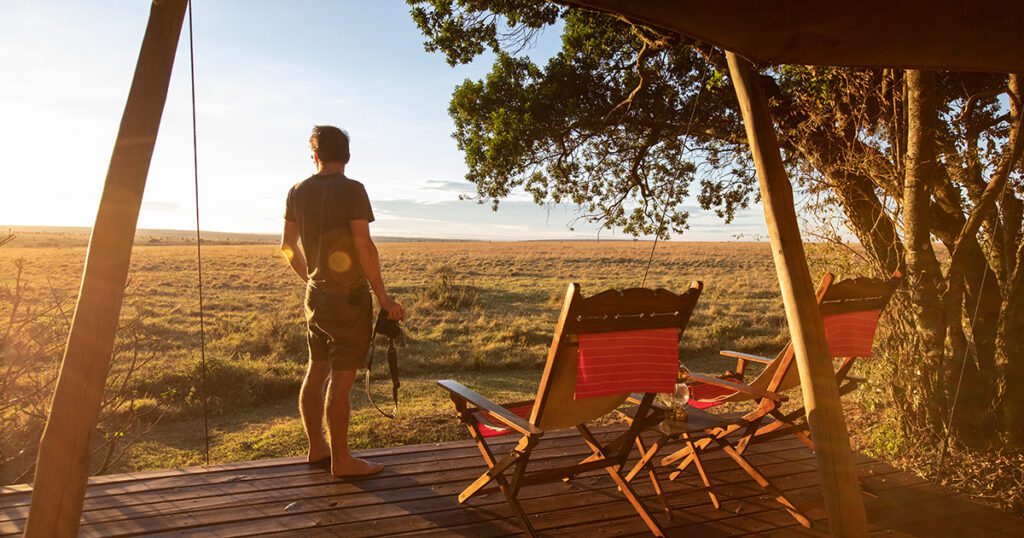
Imagine waking up to the melody of birdsong and the distant roar of lions, instead of your usual alarm clock. Stepping into frames you saw in your favourite nature documentaries seems wonderful, right? This is exactly what you’ll experience and enjoy if you decide to swap the city hustle with the magic of the wild and nature for a few days.
This experience is possible because our safari lodges and camps are nestled right in the middle of the wild, where no sighting can be missed.
Of course, then there’s the safari journey that awaits you. Throughout the day, exotic birdcalls replace the sounds of honking horns, and freely roaming animals become your neighbors. As the sun sets, painting the sky in hues of orange and pink, you realize the true essence of tranquility.
An African safari isn’t just a journey in the wild, but an extraordinary escape. From the moment you land, every sight, sound, and scent captivates you – a blissful immersion into serene landscapes, untamed wildlife, and the liberating sense of freedom that comes from disconnecting from the world.
4. Explore Natural, Historical, and Cultural Sites
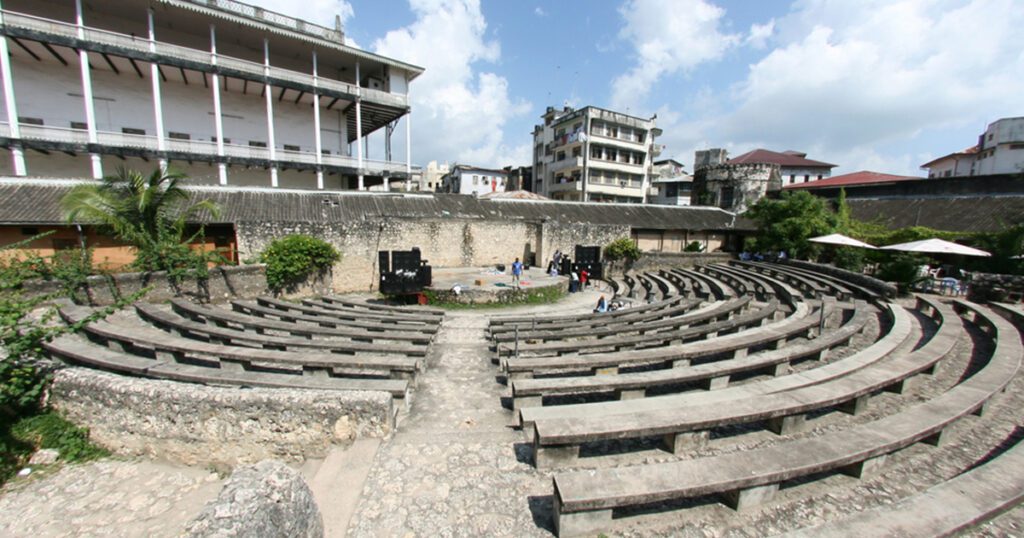
Africa is known as the “Cradle of Mankind” and features incredible historical and cultural landmarks, including many UNESCO World Heritage Sites.
Tanzania’s Stone Town, National Museum & House of Culture, Kenya’s Great Rift Valley, Lamu Old Town, and Nairobi National Museum are just a few of the beautiful historical sites.
You can enhance your experience by exploring dark tourism (visiting places historically associated with death and tragedy) in Rwanda and visiting memorial sites like Kigali Genocide Memorial, a place of remembrance of victims of the genocide against Tutsis (the second largest ethnic group in Rwanda).
Amazing mountain ranges, including the snow-capped Kilimanjaro (one of the Seven Summits), golden plains, forests, deserts, waterfalls, lagoons, rainforests, and even some of the world’s most stunning beaches can all be found there. It also boasts of Serengeti National Park, a national park that has won the World Travel Awards’ ‘Africa’s Leading National Park’ Award five years in a row, starting in 2019. African safaris will simply leave you breathless, regardless of whether you are an avid photographer or just a traveler seeking to appreciate the beauty of nature.
5. Support Wildlife Conservation And Communities
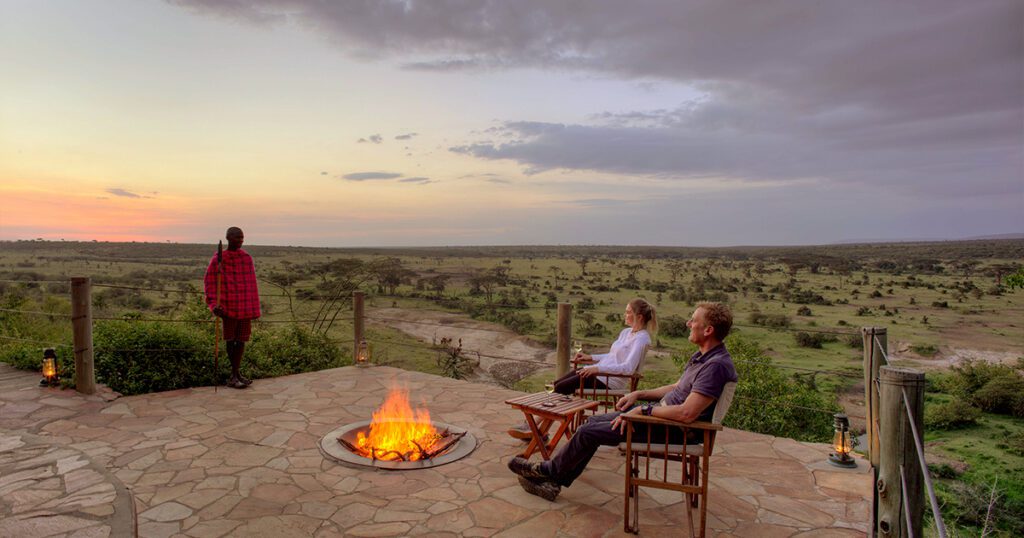
You know what’s cool about going on an African safari? It’s not merely about fulfilling a personal dream; it’s about being a part of a larger mission.
Your contribution through park fees directly aids wildlife conservation efforts and helps uplift communities. Additionally, by choosing to stay at safari lodges or camps, you’re actively supporting the livelihood of many.
At day’s end, what truly distinguishes African safaris are the stories they gift you. Each safari is a singular marvel, brimming with invaluable lessons and unforgettable moments. These are the treasures that enrich our souls, shaping our essence and reconnecting us with the awe-inspiring beauty of our world.
So, why delay? Begin crafting your African Safari plans today, assembling the pieces for an unforgettable adventure. Secure your booking with us now, and let’s turn your African safari dreams into reality. Your journey beckons—seize it with us by your side!

2024 Masai Mara Park Entry Fees & Rules
- byscarfacepride
- - May 2, 2024
Home » Archives for scarfacepride » Page 2
In January 2024, a seismic shift rippled through the wildlife conservation world as the Narok County Government of Kenya announced significant revisions to the park fees for the revered Maasai Mara Game Reserve. This decision has sparked both intrigue and apprehension among avid nature enthusiasts and prospective safari adventurers alike.
For those planning to visit the Masai Mara in 2024-2025, it’s essential to be aware of the updated entry fees and rules to ensure a smooth and enjoyable experience.
Entry Fees for 2024-2025
The Masai Mara National Reserve has updated its entry fees, effective from January 1, 2024. These fees vary depending on the time of year, visitor’s nationality, and age group.
Previously, visitors were accustomed to a standard park fee of USD 80 per day, regardless of the season. However, the latest adjustments now introduce a dynamic pricing structure, with non-resident adults facing a staggering 2.5x increase during peak seasons. This means that instead of the familiar USD 80, visitors will now encounter varying rates depending on the month of their visit.
January – June
- Foreign Non-Residents:
- Adults: $100 per person per day
- Children (3-12 years): $50 per person per day
- Students: $50 per person per day
- East African Residents:
- Adults: 4,500 KSH per person per day
- Children: 2,000 KSH per person per day
- Students: 2,000 KSH per person per day
- Kenyan Citizens:
- Adults: 3,000 KSH per person per day
- Children: 1,000 KSH per person per day
- Students: 1,000 KSH per person per day
- Narok Residents:
- Adults: 2,000 KSH per person per day
- Children (above 10 years): 500 KSH per person per day
- Children (below 10 years): Free
July – December
- Foreign Non-Residents:
- Adults: $200 per person per day
- Children (3-12 years): $50 per person per day
- Students: $50 per person per day
- East African Residents:
- Adults: 4,500 KSH per person per day
- Children: 2,000 KSH per person per day
- Students: 2,000 KSH per person per day
- Kenyan Citizens:
- Adults: 3,000 KSH per person per day
- Children: 1,000 KSH per person per day
- Students: 1,000 KSH per person per day
- Narok Residents:
- Adults: 2,000 KSH per person per day
- Children (above 10 years): 500 KSH per person per day
- Children (below 10 years): Free
Vehicle Entry Fees
Vehicles entering the Masai Mara National Reserve are subject to entry fees based on their seating capacity:
- Vehicles with less than 6 seats: 500 KSH per day
- Vehicles with 6-12 seats: 1,000 KSH per day
- Vehicles with 12-24 seats: 3,000 KSH per day
- Vehicles with 25-44 seats: 4,000 KSH per day
Balloon Services Fees
For those interested in experiencing the Masai Mara from above, the following balloon services fees apply:
- Annual balloon operational permits: 300,000 KSH
- Single landing fees for adults: $80 per person
- Single landing fees for children: $35 per person
However, the revisions don’t stop there. Beyond these fees, visitors must also navigate additional charges imposed by lodges within the reserve. These supplementary fees, ranging from $25 to $80 per adult, vary based on the lodge’s location within the park.
The implications of these changes extend beyond mere financial considerations, touching upon broader themes of accessibility, conservation, and the future of sustainable tourism in the region. There have been discussions regarding the fear that these exorbitant prices might dissuade tourists from visiting Kenya and shift them to more economical alternatives like Tanzania. But in fact, this development is precisely to create an opposite reality. A reality that hinges stronger than before on the protection and prosperity of their present.
As one of the leading safari tour operators in East Africa, we not only understand their intent, but also embrace it wholeheartedly. Here’s why.
Africa’s natural wealth is under threat:
Africa, a continent that has the world’s most biodiverse regions, including 8 of the 36 recognised global biodiversity hotspots, has lost 70% of their primary vegetation. Additionally, the forests on the East African coasts are currently one of the ten most threatened biodiversity hotspots in the world.
It’s an alarming fact that Africa is aware of, and has been taking measures to conserve biodiversity, reduce the loss of species, and slow down ecosystem degradation. It is also committed to fulfilling United Nation’s Global Biodiversity Framework’s 30 by 30 goal, which aims to conserve at least 30% of biodiversity regions and ecosystem services by 2030.
Yet the impact of their efforts has not been able to match this goal, and a lot of variables will have to fall in place to make this happen. These include, sufficient financial resources, easily accessible global funding, adequate resources for biodiversity conservation, and a lot more that is beyond the scope of this blog post.
To put things into perspective and showcase the grave reality, achieving the 30 by 30 goal would require around US $20 – $25 billion. US $20 – $25 billion.
While the revenue generated by the recent adjustment in entry fees may not reach the staggering amount required, it can be undoubtedly channelled to bolster their efforts to conserve their biodiversity.
Conservation of forests and the wildlife
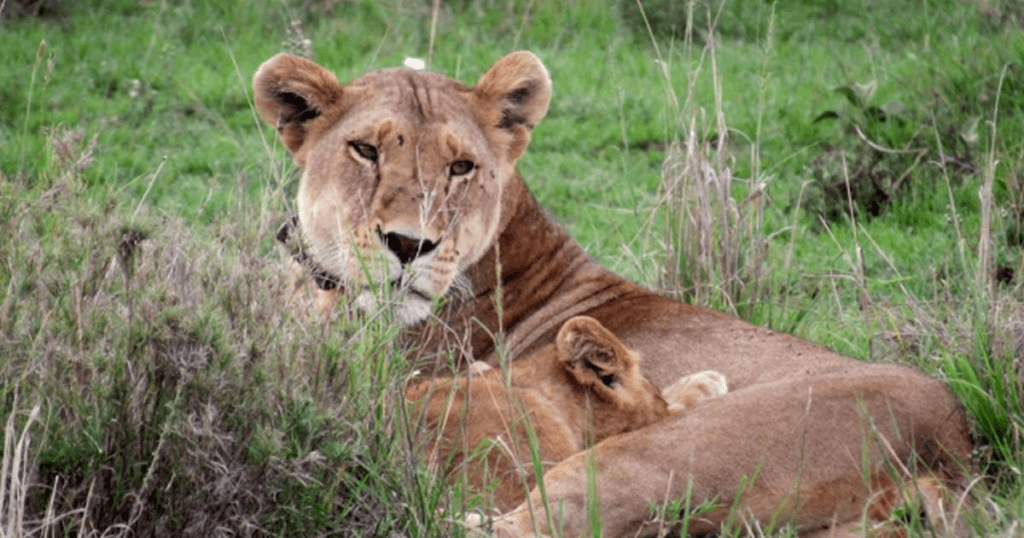
Imagine stepping into a conservancy, filled with anticipation for the wild wonders that await – from heart-pounding lion chases to heartwarming scenes of motherly care to baby elephants. But you come back with no such moments to boast about, not because that’s the unpredictable nature of safaris, but because there’s scarcity of species to see. Even the thought of their absence sounds sad and scary, right?
Unfortunately, the same wildlife species that draw travellers across the globe to Africa are in danger. The reasons range from human-inflicted harm to dwindling natural habitats. That’s why the continent, including Kenya Wildlife Services, has always been at the forefront of wildlife conservation initiatives. Their committed endeavours include combating poaching, rehabilitating habitats, reintroducing species, protecting the endangered species, and more.
Currently, the only crucial difference is, the urgency with which they need support to accelerate these efforts is at an all-time high.
The increased monetary support will help them to invest in activities that require the most attention. The scale, scope, and impact of their efforts can be amplified to give Africa’s wildlife the present and the future they deserve.
Empowerment of local communities

Think about any safari you’ve been on, and you’ll realise, the experience is only complete with the inclusion of local communities. They’re indispensable, thanks to the easy access they offer to their firsthand knowledge and culture. That’s why it’s crucial to invest in their well-being and offer monetary recognition for their efforts.
The best part is, investing in their welfare delivers dual results. The first one being an upgrade in their lifestyle. The second one being their continued role as invaluable guides for tourists.
Africa has long recognised the benefits of Payments Ecosystem Services (compensating the owners/custodians of land for providing environmental services to ensure the benefits continue) for countries like Kenya, Tanzania, and more. The increase in park fees could aid in using PES as a tool to protect ecosystems in Africa, echoing the opportunity identified by the African Developed Bank a decade ago. Furthermore, the money can be reinvested in community projects for those residing nearby.
In essence, one safari journey of yours has the potential to enrich the lives of many people, creating a ripple effect of positive changes for years to come.
Richer travel experience
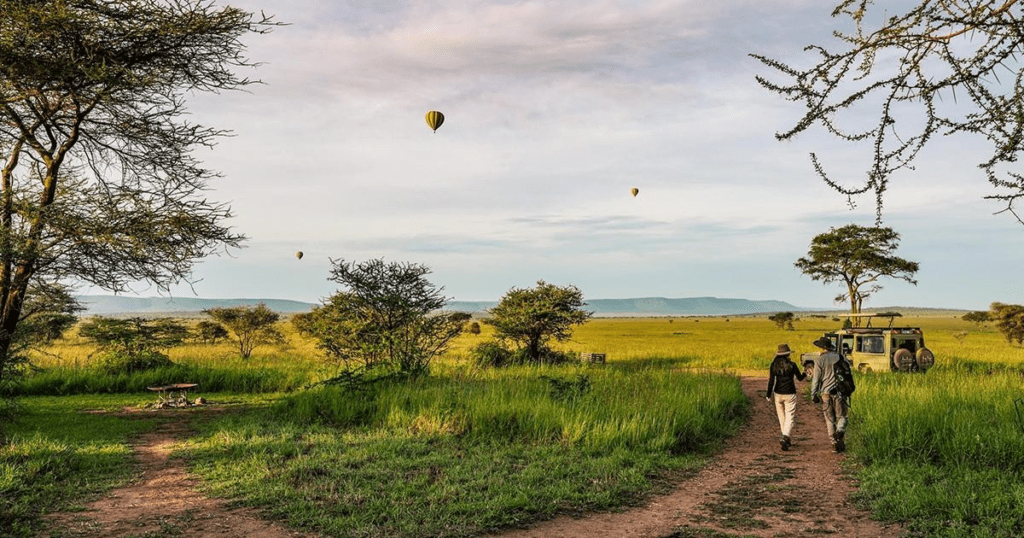
Have you wondered how amazing it would be to visit iconic parks like The Maasai Mara National Reserve during the peak season with only a few vehicles around?
One of the most beneficial outcomes of the adjustment in park fees, especially for tourists is exactly this – the prospect of fewer people around you. You’ll enjoy unprecedented access to wildlife sightings, typically reserved for the quieter times of the year. Anyone who has been there during the peak season knows this is a rarity!
Along with helping you have fulfilling safari encounters; it also reduces the strain on delicate ecosystems. Moreover, the additional funds will lead to an upgrade in park infrastructure, thereby enhancing visitor experiences.
Unsurprisingly, this change has a profound psychological impact too. The heightened fee signifies their unwavering commitment to protect their ecosystems, and the tourists who visit the parks showcase their respect towards the conservation efforts. So naturally the visitor demographic will be eco-conscious, united by their dedication to responsible tourism. Picture yourself travelling with these like-minded tourists. Meeting them and going back home taking new meaningful friendships is going to elevate your safari experience even more!
How beautiful is this fact that you get to experience a safari like never before, all while contributing to the preservation of their unique ecosystem!
Planning Your Visit to the Masai Mara National Reserve
When preparing for a trip to the Masai Mara National Reserve, it’s essential to familiarize yourself with the entry fees and regulations. This renowned reserve provides an unparalleled opportunity to witness the beauty and diversity of African wildlife in its natural habitat. However, adhering to the rules and guidelines is vital to preserving this natural wonder for future generations.
Rules and Regulations
- Speed Limits:
- Maintain a speed of 50 km/h on graded roads.
- Limit your speed to 30 km/h on other roads.
- Wildlife Interaction:
- Always reduce speed when approaching animals.
- Off-track driving is forbidden, especially in High Use and River Zones.
- Driving off-road is allowed only in Low Use Zones for big cat sightings.
- Keep at least 25 meters away from animals.
- Avoid making noise; do not shout, clap, cheer, or hoot.
- Vehicle Conduct:
- Refrain from sitting or standing on vehicle roofs.
- A maximum of 5 vehicles is permitted at any wildlife sighting. If there are more than 5 vehicles, viewing time is restricted to 10 minutes, and any waiting vehicles must stay 100 meters away.
- Migration Crossings:
- Do not leave your vehicle at river crossing points during the migration.
- Avoid driving through migrating herds.
- Border and Behavior:
- Do not cross the border into Tanzania.
- Do not chase, follow, or disturb animals.
- Dispose of litter properly; littering is strictly forbidden.
- Park Hours:
- Entry and exit are only allowed between 7 AM and 7 PM.
By understanding and following these guidelines, you contribute to the conservation efforts of the Masai Mara National Reserve. Your cooperation helps maintain the reserve’s ecological balance, ensuring that its natural beauty and diverse wildlife can be enjoyed by future generations. Prepare thoroughly, respect the rules, and enjoy an unforgettable safari experience in one of Africa’s most iconic landscapes.
In Conclusion
In conclusion, Scarface Pride staunchly supports the recent hike in park fees at the Maasai Mara Game Reserve and other Kenya Wildlife Services (KWS) managed parks. Despite its initial appearance as a deterrent for tourists, this measure is viewed as a crucial step towards safeguarding Africa’s natural wealth and biodiversity. The increase in fees serves as more than a revenue-generating tactic; it is a strategic move aimed at bolstering conservation efforts, protecting endangered wildlife, and empowering local communities. With vital financial resources provided, these initiatives can be amplified to achieve ambitious conservation goals and ensure the preservation of Africa’s ecosystems for future generations.
Furthermore, the adjustment in park fees not only enhances the travel experience for tourists by offering fewer crowds and improved wildlife sightings but also signifies a shared commitment to responsible tourism and environmental stewardship. Scarface Pride believes that The Masai Mara National Reserve continues to be a premier destination for wildlife enthusiasts and travellers seeking an unforgettable

African Safari Packing Guide
- byscarfacepride
- - March 24, 2023
Home » Archives for scarfacepride » Page 2
It is the season for planning amazing trips and we are all excited. But aren’t you bored of conventional trips and tours? Well, if that is the case, we have an intriguing option for you to explore.
African Safaris are a great option if you want to relish nature and wildlife closely. These are quite different from ordinary trips owing to the fact that such expeditions take you deep into nature among the wild realms. Therefore, everything might not be accessible at hand which calls for a packing spree that makes sure you have everything in place before leaving.
If that has gotten the hoarder in you worried, we have you sorted. For an African Safari, your packing list should entail some necessities that keep you covered considering the factors of climate, environment, and availability of resources.
Thus, we have curated a comprehensive list of some packing essentials for you to enjoy a wonderful African Safari.
Everything you need for your first safari—or your tenth African Safari
Must-Have Documents for a Seamless Travel
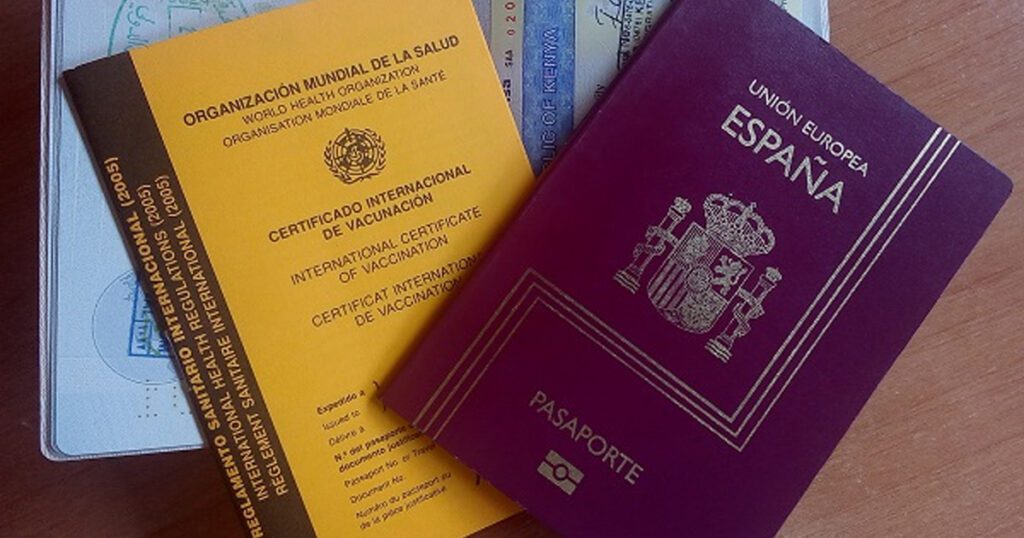
Documents are essentials that you should never miss. Make sure you have the following documents at hand when you are travelling abroad for an African Safari:
- Original passport
- Credit or debit cards
- Travel insurance documents
- Directional maps or itineraries
- Medical and vaccination certificates
- Valid visa
- Copies of essential documents like the photo identification card, first four pages of the passport, and so on
Backpacks to stuff all things Essentials
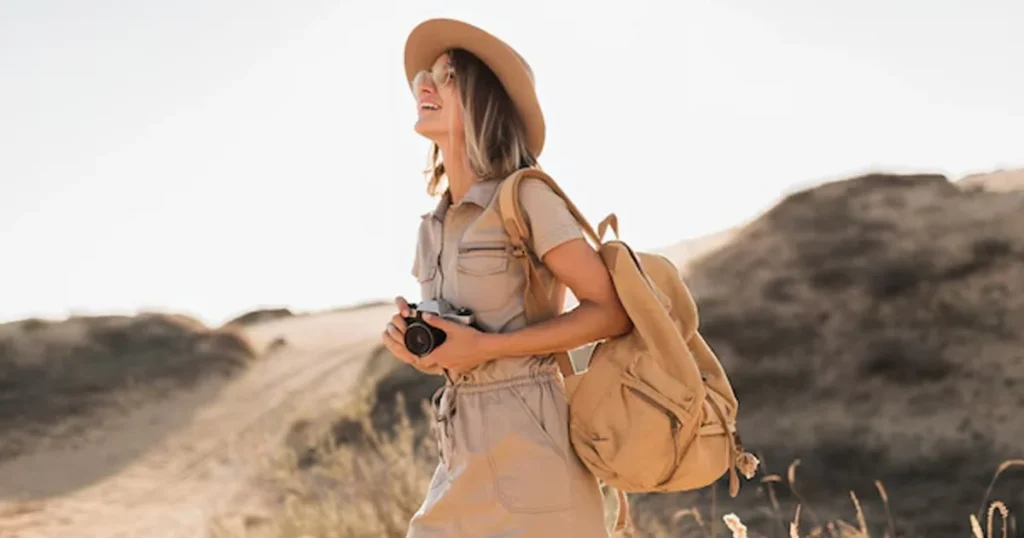
Backpacks will come in handy when you are out on dusty safari expeditions since they can help you carry all your essentials. Invest in a lightweight, compact, and compressible backpack that is easy for you to take with you throughout the day. Another option is duffel bags with detachable straps that can be easily accommodated in small spaces.
Shoo Away the Critters with Insect Repellents

Jungle safaris call for carrying some good insect repellents that can protect your skin from insects and critters. Make sure that you carry one that suits your skin type to avoid any allergic reactions on your trip. Also, eco-friendly insect repellent lotions or body mists are impeccable options since they are gentle to the environment as well as your skin.
Cover yourself in layers of comfortable clothing
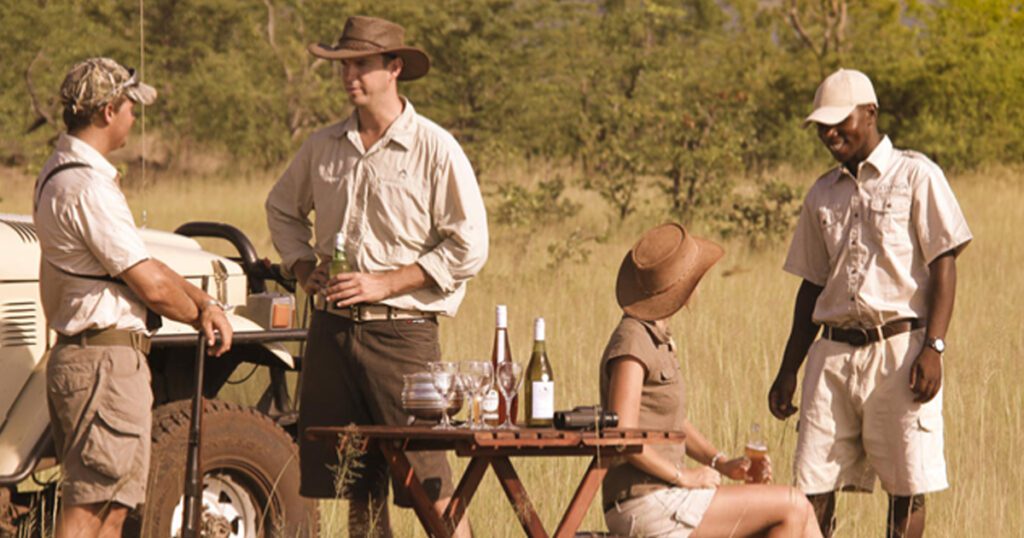
When you are out on a wildlife safari, staying comfortable is a priority. Thus, you should pack clothing items that keep you comfortable yet stylish.
Wear a t-shirt or a tank top and layer it with a sweater or a collared long-sleeved top. Add a jacket in case the weather is too cold. Wear long pants made from breathable fabric like cotton and linen. Don’t forget to wear a sunhat too!
Shades of khaki, green, and brown work well with the natural realms of Africa. Go for light colours if you’re stepping out for an evening meal. And ladies, if you want to spruce it up for a romantic sundowner or a bush meal, wear a cute and casual dress with a scarf so that you feel comfortable and look stylish too! Plus, you can pack in some cute swimwear and comfy dresses when you want to lounge around the pool area of your hotel.
Comfortable Footwear for a Walk in the Woods
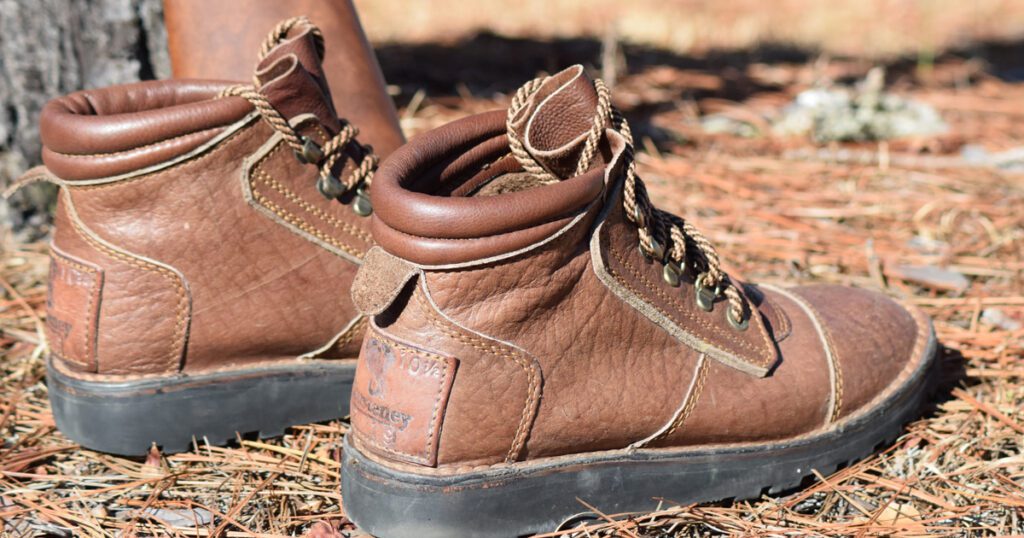
While on an African Safari, you will probably be taking long walks amidst bushes and wet jungle patches. Thus, comfortable footwear is an essential item to travel with. You can opt for lightweight, easy-to-clean and comfortable ankle length boots.
If the hike isn’t difficult, you can opt for casual, slip-ons and footwear that are easy to take on and off for a hassle-free expedition. These will also be helpful when you are casually strolling in the camp area or when you’re chilling in the room.
Medicines and First-Aid, your Health Saviours

This one is a point that can’t be emphasized enough. Pack all your necessary medicines and prescriptions that you might need on the trip. However, private safari vehicles are equipped with first-aid kits, so you can also skip this part if you want.
If you don’t want to carry along a full-fledged first-aid kit, you can opt for some specific medical items. First-aid elements like paracetamol, anti-nausea tablets, allergy medications, rubbing alcohol, bandaids, gauze, anti-malaria tablets, painkillers, pre-prescribed medication, diarrhea medication, antiseptic spray, insect repellent, rehydration sachets, bite cream, are some must-haves on an African Safari.
Spirits and Devices – Charge them both
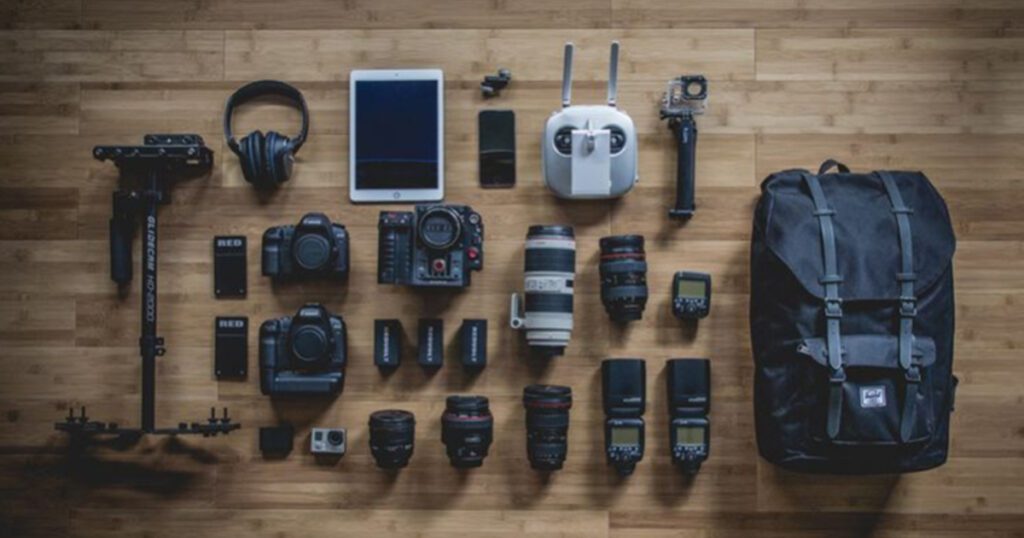
You don’t want to roam around looking for charging devices and electronic essentials while out on a safari. To avoid such incidents, make sure you pack electronic items such as power cables, portable chargers, global adapters, and extra batteries.
Laptops, phones, and cameras might require separate charging devices. Ensure that you carry the ones that fit your purpose. Also, don’t miss out on a global adapter to avoid any hassles while charging your devices.
You would want to capture the scenic views that you witness while out on the jungle expeditions. Hence, carry along a camera and some extra storage space for that purpose.
Explore the Breathtaking beauty with Binoculars
You don’t want to miss out on any amazing wildlife activities only because you don’t have a pair of good binoculars to yourself. Hence don’t forget to carry a pair that will help you observe some breathtaking scenes closely.
Some Additional Tips that can come in handy while packing for an African Safari
Don’t Overpack
While the excitement of going on a jungle safari might make you want to pack anything and everything, make sure you don’t overpack. Keep the baggage limit in mind while packing for both domestic and international flights. Usually, in bush planes in Kenya, the limit is 15 kgs while in Tanzania the limit is 20 kgs.
Don’t carry Expensive Items such as jewellery Pieces
You don’t want to lose out on precious and expensive belongings during the trip. Therefore, avoid carrying items such as jewelry pieces to avoid any such incidents.
Carry the Necessary Vaccination Certificates
Before you fly to East African Countries, make sure that you carry all the necessary vaccination certificates that you might require. These could include certificates pertaining to Yellow Fever vaccination, TF vaccination, routine vaccinations like MMR (measles-mumps-rubella), polio, hepatitis and DPT (diphtheria-pertussis-tetanus), and so on.
Always keep the Camera handy
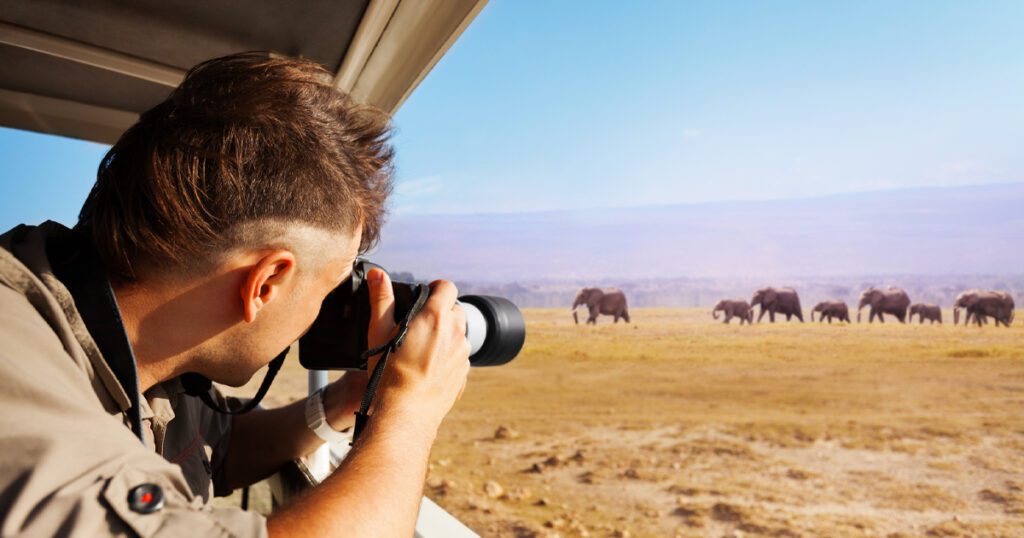
The African Safaris will offer you exemplary views of the natural realms. Therefore, always keep the camera handy so that you can capture all the beauty that pleases your eyes.
Wet bags work best for Toiletries
While packing the toiletries, you should always carry wet bags so that the moisture does not seep inside the rest of your luggage. Also, don’t forget to keep essentials such as scarves and wet wipes to keep yourself covered for the dusty tours.
Pack wisely and efficiently….
With all these checklists in mind, you will be nicely prepared for an African Safari. Just make sure you do not miss out on any essentials so that you don’t have to roam around looking out for them. Pack in all these items and don’t forget to bring along an adventurous spirit to put together the experience of a lifetime for yourself.]
FAQs: African Safari
Which are some must-have documents for an African Safari?
Following are some must-have documents for an African Safari:
- Passport
- Valid visa
- Credit or debit cards
- Travel Insurance documents
- Directional maps or itineraries
- Medical and vaccination certificates
- Copies of essential documents ike the photo identification card, first four pages of the passport, and so on
What toiletries should you carry before leaving for an African Safari?
Travel-size toiletries, sunscreens, and items such as sanitary napkins and tampons, should be carried while travelling for an African Safari.
Can I carry expensive jewellery on African Safaris?
You don’t want to lose out on precious and expensive belongings during the trip. Therefore, avoid carrying items such as jewellery pieces to avoid any such incidents.
What footwear works the best for African Safaris?
You can opt for lightweight, easy-to-clean and comfortable hiking boots. In case you want to dress up while chilling in the hotel room, a pair of good-quality sneakers would be great to carry along.
What electronic devices should I take along for an African Safari?
Before leaving for an African Safari, make sure you pack electronic items such as power cables, portable chargers, global adapters, and extra batteries.
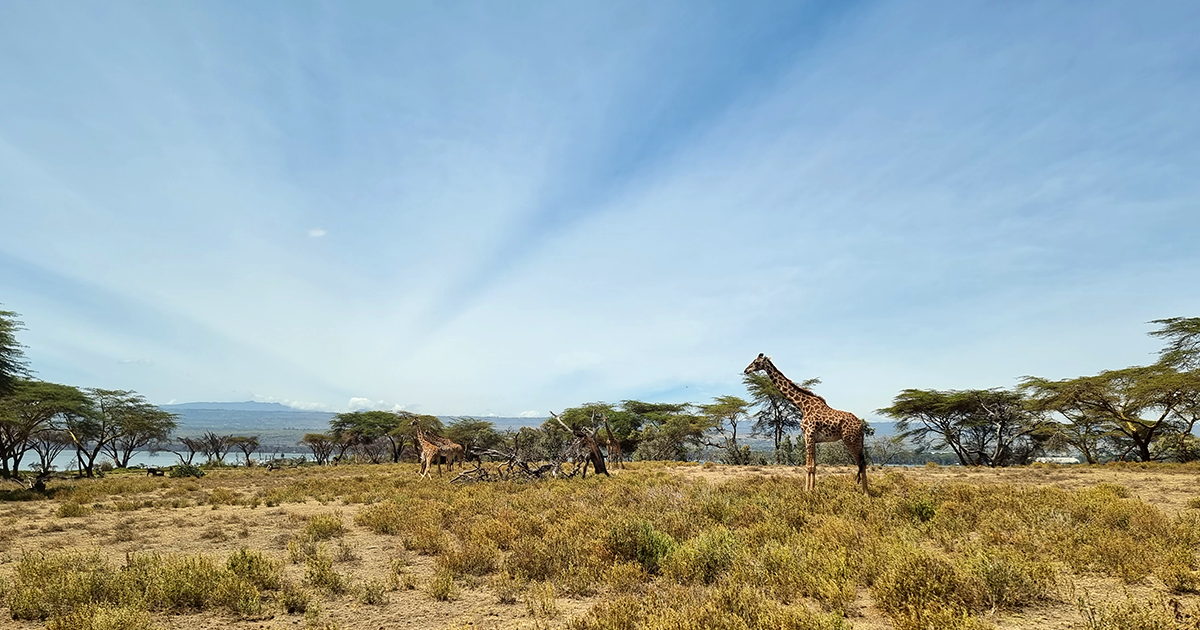
How to Plan Your African Safari
- byscarfacepride
- - October 31, 2022
Home » Archives for scarfacepride » Page 2
The secret superpower of Africa is that it metamorphoses people.
Are you someone looking forward to modifying your perspective, refreshing your prerogatives, and redirecting your mindset? If your answer is yes, then trust us, all you need to do is just visit Africa. Do you know what attracts tourists from all over the world to this beautiful continent? It’s an African safari.
Traveling across this improbable mainland will do something sublimely beautiful to you at the spiritual level. But! Before you visit there, you must know certain things to relish your trip to the maximum. So, what are you waiting for? Settle down at the best location of your home and enjoy the next few minutes of reading with a cup of coffee.
Best Time To Travel
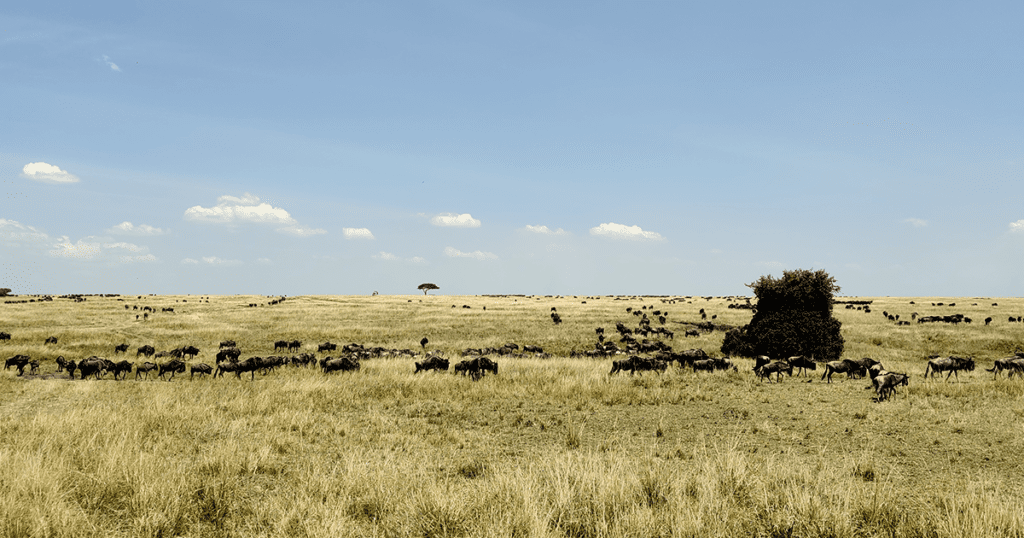
It’s truly important you know the best time to go for African safaris. Woah! Calm down! We didn’t say Africa’s wildlife is going somewhere, it will be there throughout the year. But! Not every time you visit there will be the best, and there lies the significance of the research.
The foremost reason to go on safaris is to see animals, do wildlife photography, and enjoy the fresh air. And time plays a crucial role in making and breaking your trip. Here’s your answer to the question why. Going on an African safari during the rainy season will be a little hard on your trip because animals keep themselves obscured during this season, and not only this but the golden and dusty African streets will also make it a little difficult to make your way on the roads.
The dry season is the most satisfactory time to go on a safari in Kenya. The dry season includes months from June to October, January, and February. During this time of the year, animals make their way out of their homes in search of water, making it more manageable to spot them. You might get lucky and also witness the iconic Wildebeest Migration.
The Great Wildebeest Migration is the most eminent wonder in wildlife that we would suggest you have a glimpse of, at least once. During this time, a herd of millions of zebras, wildebeests, and gazelles migrate from Serengeti to Mara. The Great Wildebeest Migration attracts several wildlife photographers & travel enthusiasts across the world.
Play by the rules & respect the nature
While experiencing a jungle safari, it is necessary to follow certain rules and regulations, these rules have been formulated to ensure no one spoils nature’s beauty and disturbs the wildlife. Your guide will help you get acquainted with the rules put up by the parks’ governance authority.
Below we have shared some of the basic yet efficacious rules with you:
- Be attentive
- Do not get out of the safari car
- Don’t try to feed animals (they might provide on you instead)
Sunrise & Sunset Game Drive
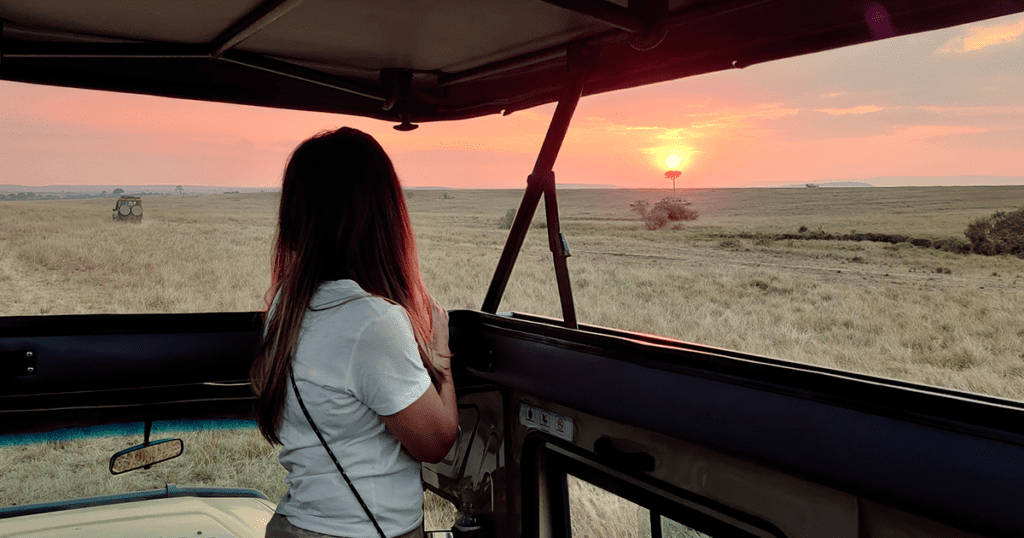
Now, this is something you must not miss, no matter how many times you’ve been on an African safari, if you haven’t seen the sunrise and sunset game drive, you haven’t glimpsed the best part of an African safari yet.
The Sunrise game drive is the best time to spot male lions. Pertaining to their mane, they generally hide away and remain inactive during the day as sun is at its peak.
African countries are known for their awe-inspiring nature and breathtaking game drives, and trust us, once you catch sight of these incredible game drives you’d crave for more.
S(t)ay It Right
One of the crucial parts of your preparation must be where you choose to stay. In the vast expanse of savannah, you might not get lost, thanks to your guide, but you might end up spending a lot of time getting from point A to B. The whole place is home for the wild so you will have lot more sighting along the way. Do not forget to say “JAMBO” to the other travelers on the way as the guide stop by to take cues from other guides or just to greet a friend.
There is a wide array of lodges & camps within the main park & surrounding conservancy. It’s always advisable to stay within the conservancy because this way you’ll be able to rest adequately and will stay near to the best game points.
Malaria- Do I Need To Take Any Measures?
Malaria is a potentially baneful illness mainly found in tropical and sub-tropical regions. This disease is transmitted to humans when they’re bitten by infected mosquitoes.
Malaria transmission is at its peak during the wetter and warmer months (November, December, January, February, March, and April). The months of May to October are the safest to visit Kenya, as, during this time of the year, the risk of contracting Malaria is almost negligible.
You’d never want your trip to go down in vain because of illness. We suggest you to consult a doctor well before traveling so you get your inoculations (yellow fever or so) & course of medicine in time.
Don’t forget! Your health comes first!
Get Those Flight Tickets
To stay where your heart desires, get your bookings done at least 3 to 4 months before you head out for an African safari during the peak season.
For an instance, if you are looking forward to traveling in the month of September, we would suggest you get your bookings done in the month of June of the current year so you get your desired camps before it is all booked out
Travel Budget
An African safari will not be a bargain basement. Although there is a broad range of itineraries and travel styles available, there are so many logistics concerned with going on an African safari.
It would be best to have a budget estimate keeping food, accommodation, flights, and safari tickets in mind. We agree with you, it’s always an overwhelming and cautious process to decide how much money you are ready to invest in your travels. In spite of that, this is one of the fundamental and significant things everyone must consider.
All Set To Go?
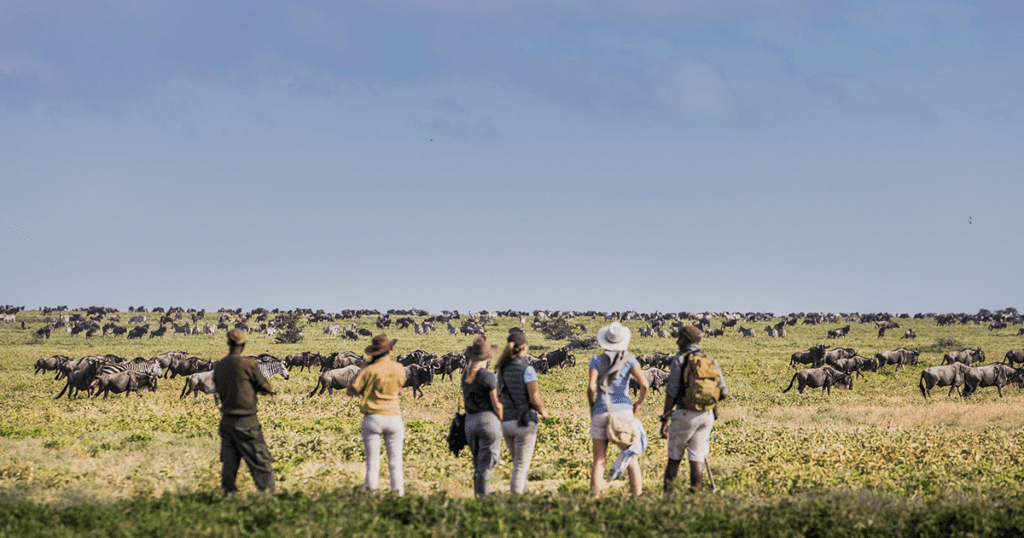
Tada! Now you are all equipped to explore African wildlife. Now it’s time to get ready for all the amusements of the season and happiness throughout the year.
